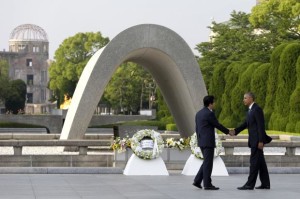
In this file photo (taken May 27, 2016), US President Barack Obama, right, shakes hands with Japanese Prime Minister Shinzo Abe at Hiroshima Peace Memorial Park in Hiroshima, western Japan, as Obama became the first sitting US president to visit the site of the world’s first atomic bomb attack. Abe said Monday, Dec. 5, he would visit Pearl Harbor with Obama at the end of this month, becoming the first leader of his country to go to the US naval base in Hawaii that Japan attacked in 1941, propelling the United States into World War II. Atomic Bomb Dome is seen in the background. (Photo by CAROLYN KASTER/AP)
TOKYO — Japanese Prime Minister Shinzo Abe will visit Pearl Harbor with US President Barack Obama at the end of this month, becoming the first leader of his country to go to the US naval base in Hawaii attacked by Japan in 1941, propelling the United States into World War II.
Monday’s unexpected announcement came two days before the 75th anniversary of the attack and six months after Obama became the first sitting US president to visit the memorial in Hiroshima for victims of the US atomic bombing of that city at the end of the same war.
Abe, in a brief statement to reporters, said he would visit Hawaii on Dec. 26 and 27 to pray for the war dead at Pearl Harbor and to hold a final summit meeting with Obama before the latter’s presidency ends.
“We must never repeat the tragedy of the war,” he said. “I would like to send this commitment. At the same time, I would like to send a message of reconciliation between Japan and the US.”
The White House confirmed a meeting in Hawaii on Dec. 27, saying “the two leaders’ visit will showcase the power of reconciliation that has turned former adversaries into the closest of allies, united by common interests and shared values.”
More than 2,300 US servicemen died in the aerial attack, which will be marked Wednesday by a remembrance ceremony and a moment of silence at 7:55 a.m., when the Japanese planes hit their first target.
Three and a half years later, the war came to an end after the US dropped atomic bombs on Hiroshima on Aug. 6, 1945, and on the city of Nagasaki on Aug. 9, 1945. Japan surrendered six days later.
Obama’s decision to visit Hiroshima in May divided Americans and was broadly welcomed in Japan. Abe said Monday that Obama’s message aiming for a world without nuclear weapons still touches the hearts of many Japanese.
In the seven decades since the war, the United States and Japan have become staunch allies in one of the more remarkable turnarounds of former enemies in world history.
“Our talks in Hawaii will be a chance to show the rest of the world our ever stronger alliance in the future,” Abe said.
The announcement of the summit comes as Japan worries about the direction of US foreign policy under Obama’s successor, Donald Trump.
The president-elect said during the campaign that Japan and other allies should contribute more to the cost of stationing US troops in their countries. About 50,000 American troops are based in Japan.
Abe met with Trump in New York last month. He wouldn’t disclose details, but said that Trump is a leader he can have great confidence in.